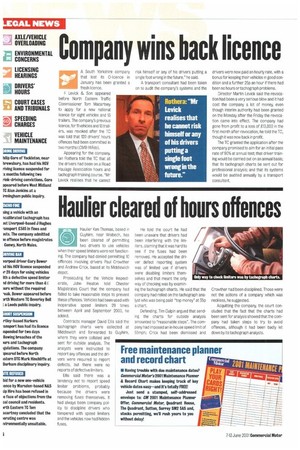Haulier cleared of hours offences
Page 16

If you've noticed an error in this article please click here to report it so we can fix it.
Haulier Ken Thomas, based in Guyhirn, near Wisbech, has been cleared of permitting two drivers to use vehicles when their speed limiters were not functioning. The company had denied permitting 10 offences involving drivers Paul Crowther and Andrew Crick, based at its Middlewich depot.
Prosecuting for the Vehicle Inspectorate, John Heaton told Chester Magistrates Court that the company had failed to take reasonable steps to prevent these offences. Vehicles had been used with inoperative speed limiters 29 times between April and September 2000, he added.
Contracts manager David Ellis said the tachograph charts were collected at Middlewich and forwarded to Guyhirn, where they were collated and sent for outside analysis. The analysts were instructed to report any offences and the drivers were required to report defects, but there were no reports of defective limiters.
Ellis said there was a tendency not to report speed limiter problems, probably because the drivers were removing fuses themselves. It had always been company policy to discipline drivers who tampered with speed limiters and the vehicles now had hidden fuses. He told the court he had been unaware that drivers had been interfering with the limiters, claiming that it was hard to see if the fuses had been removed. He accepted the driver defect reporting system was of limited use if drivers were disabling limiters themselves and that meant the only way of checking was by examining the tachograph charts. He said that the company had relied on the tachograph analyst who was being paid "top money" at 35p a chart.
Defending, Tim Culpin argued that sending the charts for outside analysis amounted to "reasonable steps". The company had imposed an in-house speed limit of 55mph; Crick had been dismissed and Crowther had been disciplined. Those were not the actions of a company which was reckless, he suggested.
Acquitting the company, the court concluded that the fact that the charts had been sent for analysis showed that the company had taken steps to try to avoid offences, although it had been badly let down by its tachograph analysts.




































































































